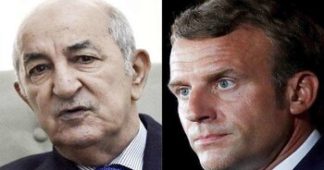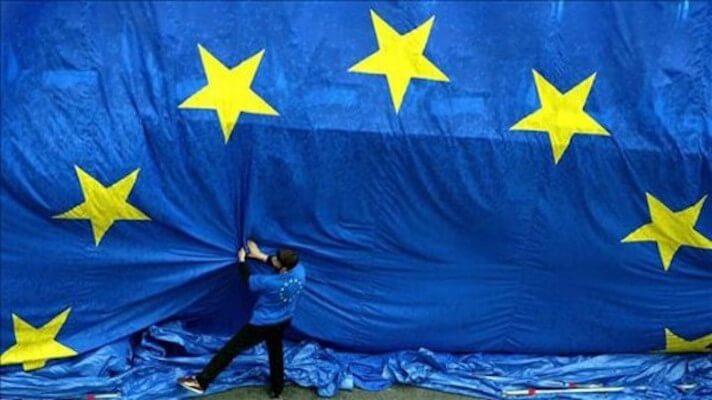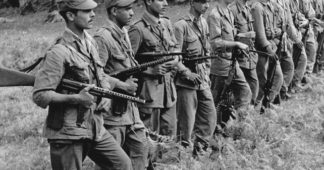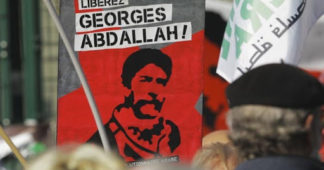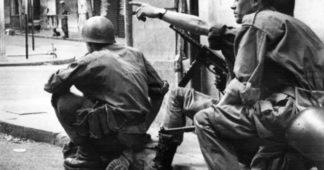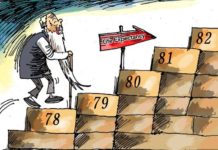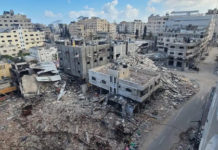by Tom Hazeldine
May 29, 2025
With the death of Hugh Roberts, the world has lost a foremost scholar of contemporary Arab politics and history. His last book, Loved Egyptian Night (2024), a retrospect on the Arab Spring uprisings in Egypt, Libya and Syria, displayed the adamantine clarity that characterised all his work: ‘If politics – in the sense of the practice of politics – is, as Bismarck declared, an art, not a science, the study of politics must be a branch of criticism’, he begins. As such, like any criticism worth its salt, it had to be intellectually rigorous and independent-minded. In his view, commentary on international politics too often resembled a chorus, and Roberts had no time for choruses.
He was born in 1950 into a Labour household in Hull, the son of a university lecturer. The family moved to Middlesex and he went to St Paul’s as a scholar and then – after a gap year in Paris at L’Express magazine, which gave him fluent French – to Oxford, also on a scholarship. Hugh’s introduction to the Arab world was almost accidental. His older sister Ceridwen got a place on a study trip to investigate cooperative industrial management in Algeria. When she fell ill, she asked if her brother could go instead. This was the early seventies, and it was the beginning of a lifetime’s attachment. For his doctoral research he had planned to study the agrarian revolution undertaken by the Boumédienne regime, but developed a fascination instead with the political development of the rebellious Kabylia region in the Tell Atlas mountains, and set about investigating the relations between Berber populations and their Arabic-speaking compatriots. Roberts identified the survival of pre-colonial political institutions among the Kabyles, leading him to question the local applicability of Ernest Gellner’s depiction in Saints of the Atlas (1969) of an ‘ungoverned people’. He spent a year teaching English in Bouïra on the southern edge of the region, eighty miles southeast of Algiers, and another conducting fieldwork during the long university holidays.
The Kabyles played a major role in the wartime National Liberation Front (FLN), a group Roberts admired for its strategic clarity in the armed struggle against French colonialism (1954-62):
in abandoning agitation within the framework of French legality as futile and going to war with France instead, the FLN was displaying a hard-headed realism, drawing the lesson of repeated disappointment, seeing a blind alley for what it was, and redeploying to very different ground, that of guerrilla warfare, the maquis or, as Algerians call it, al-jebel (‘the mountain’). In doing this the FLN’s founders were revolutionising their praxis and themselves, transforming Algerian nationalism from a movement making claims to a movement creating facts, and its activists from petitioners to the agents of liberation.
That identification was in contrast to Roberts’s labourist politics at home, where he was a member of the latter-day Ernest Bevin Society, an emanation of pro-Unionist Anglo-Irish Marxism named in retrospective honour of Attlee’s Cold War Foreign Secretary. Roberts extolled what he saw as Bevin’s practicality, working-class strength and values, and down-to-earth ‘horse sense’. We discussed this over lunch in Soho, where we met up in 2022 when I was editing Loved Egyptian Night. It was a point on which we politely but firmly differed. Kenneth Morgan, no leftist à outrance, long ago drew attention in Labour in Power (1984) to Bevin’s blunderbuss anti-Communism – ‘grimly satisfied’ by Churchill’s Fulton speech, he was a man of ‘strong views but no great reserves of knowledge’; ‘instinctively committed’ to British military intervention in the Middle East, his attitude to the colonial world was ‘virtually indistinguishable from those of Conservative or imperialist administrations in the past’. On the other hand, Roberts saw straight through Kinnock’s media-friendly platitudes. Later, writing in Prospect towards the end of Blair’s tenure in 2006, he excoriated New Labour as ‘an empty shell, hollowed out, disoriented, compromised, corrupted, abandoned in despair and disgust’. He told me that a real party kept its big battalions on the wing and swept onto the centre-ground for battle, not triangulation.
It was our only meeting. Roberts had strong views but an inquiring mind, and the conversation felt expansive: it could go anywhere. He told me he wrote short stories for recreation and gave me a sense of his background. His first teaching job was at the School of Development Studies at the University of East Anglia from 1976 to 1988. He had family links with King’s Lynn and north-west Norfolk and a lasting affection for the area, but found university life in Norwich constrictive. As he later wrote:
I was unable to inhibit myself from thinking politically about the subjects of my academic research, and I was unwilling to confine my thinking or my writing within the mental parameters and terminological protocols of any of the existing schools of thought which I came across in academia. I found as a result that I had great difficulty in getting my thoughts published in the form of academic publications, and that my prospects of a fulfilling academic career were nil. When I had satisfied myself that this was the case, I resigned my lectureship and went out into the world.
He went first to London, as a freelance writer and consultant for petroleum giant BP among others, while also editing the Bevin Society’s Labour and Trade Union Review and keeping a close watch on the developing crisis in Algeria, which he visited on six further occasions from 1992 onwards, publishing across a wide array of outlets. Shortly after 9/11, Tariq Ali commissioned a Verso book from Hugh over dinner in Cairo. The Battlefield (2003), subtitled ‘Studies in a Broken Polity’, collects his careful and precise writings on Algeria for International Affairs, Middle East International, the Times Literary Supplement and elsewhere, from the 1988 riots sparked by Bendjedid’s capitalist-liberalisation measures through to the legislative elections of May 2002 when the FLN recovered its primacy. Roberts rejected categorisation of this ‘terrible drama’ as a civil war, since rival centres of state formation did not emerge. He termed it instead an ‘extravasation’ (leakage) of factional conflict, warped by French and other Western power brokers, following the intellectual exhaustion of the FLN state, the collapse of nationalism as an organised political force and its eclipse by Islamism. Neither democracy nor law-bound government was going to be imposed from outside, he insisted. ‘External pressure has served only to induce the Algerian authorities to dress their window or make yet more concessions on the economic front.’
Roberts returned to academic life in 1997 as a senior research fellow at the LSE. Four years later he moved to Cairo and into public advocacy as North Africa Director of the International Crisis Group, an Atlanticist ‘conflict prevention’ NGO. His first Crisis Group briefing assessed the Black Spring in Kabylia, a huge protest movement triggered by the brutality of the Algerian Gendarmerie Nationale in the worse repression since Independence. The report made some two dozen recommendations but only a couple were directed at any outside power, the European Union. The burden was on Algerian political forces to summon the imagination and resolve to fix their own problems.
In private Roberts could be sharply critical of the ICG as a sometime advocacy group for offensive US military operations, beginning in Yugoslavia in the nineties. He left the organisation in 2007 and resumed his research on the history of Kabylia. Four years later, as the Arab Spring gathered pace, he briefly returned to the ICG fold. Ben Ali fled Tunis on 14 January 2011 and Mubarak was forced to resign in Cairo on 11 February, which in turn helped to set off unrest against Gaddafi in Benghazi. (As for Algeria to the west, Roberts speculated that early street protests were instigated by the regime’s intelligence services ‘to let air out of the balloon in good time’.) He told the ICG he would return to his role on the understanding that he would not be recommending Western military intervention in North Africa. On 22 February he jotted down ‘Thoughts on the Libyan Crisis’ for internal Crisis Group consumption:
1. Yesterday was my first day back in harness as North Africa Project director. I have had a lot to do, hence my slowness to react to the Libyan situation. I now feel as if I am looking at a runaway train. It may be too late for me to persuade ICG to pause before it acts, but I am going to try.
2. With the news of the violence in Libya, and especially the regime’s repressive response to the protests, colleagues seem to have got very excited, naturally enough. But excitement – and horror is of course a form of excitement – is not a good state of mind in which to take wise policy decisions. I sympathise with Rob [Malley’s] complaint about the ‘cacophony’.
3. There seems to be a groundswell of support inside as well as outside ICG for a serious form of international intervention of the more heavy-handed variety, involving quite explicit violation of Libyan national sovereignty (e.g. no-fly zones) for essentially (or at least avowedly) humanitarian reasons. Before ICG nails its own prestigious colours to this mast, I suggest we take a moment to consider what outcome we wish to see that is a possibility of practical politics, as far as this can be gauged from the reliable – as distinct from unreliable – information available.
Although it drew energy from the uprisings in neighbouring Tunisia and Egypt, the protest wave in Libya was ‘dashing against a very different kind of rock’. The Gaddafi regime was a personalist, jerry-built structure, categorically different from the Egyptian army-state which wasn’t reducible to Mubarak’s incumbency. ‘Mubarak’s threat of “me or chaos” could be treated as a bluff to be called’, Roberts noted. ‘But there is a very real danger that Libya will collapse into real, prolonged and extremely violent chaos if the Gaddafi regime falls at this juncture.’ This proved prescient. Sarkozy and Cameron were blithe cheerleaders for a NATO bombing war against Libya, toppling Gaddafi who was captured and killed on 20 October, and reducing the country to an anarchy of warlords and militias. Roberts penned a memorable broadside and historical exposition for the London Review of Books. ‘So Gaddafi is dead and NATO has fought a war in North Africa for the first time since the FLN defeated France in 1962’, he began, pointedly asking: ‘What if anything has Libya got in exchange for all the death and destruction that have been visited on it over the past seven and a half months?’
A sequel on Egypt, also for the LRB, acknowledged that the youth behind the early protests in Tahrir were ‘certainly revolutionary in spirit’. Still, Mubarak’s removal bore the marks of a military reshuffle, not a revolutionary overthrow. That the Egyptian polity was still bound by the logic of the Free Officers’ state established in 1952 was made plain by General Sisi’s coup against Mubarak’s elected successor, the Muslim Brotherhood’s Mohamed Morsi, on 3 July 2013. Roberts then went on to address the civil–proxy war in Syria, ‘terminus of the Arab Spring’, castigating Secretary of State Clinton and her European bag-carriers for trying to recycle their Libyan regime-change policy in Damascus, closing the door on efforts to secure a negotiated settlement before the country was largely destroyed. ‘Western policy has been a disgrace and Britain’s contribution to it should be a matter of national shame’.
Late in 2011 Roberts had departed the ICG for the second and last time to take up a professorship at Tufts University. Two books, Berber Government: The Kabyle Polity in Pre-Colonial Algeria and Algérie-Kabylie, études et interventions, appeared in 2014. The first was an expansion of his PhD research, which sought to capture the inner workings of the Kabyle polity in the late Ottoman period. The second was a collection of essays spanning 1994 to 2010, many taken from the Algerian journal Insaniyat, along with interviews, talks and reflections on Gellner and Bourdieu. Approaching retirement in 2021, he wrote to Verso saying he was ready to revisit the Arab Spring, a decade on (‘Minerva’s owl flies at dusk’). He would mount intensive investigations of two pivotal moments, Tahrir Square in January-February 2011 and Benghazi in February-March, to get to the bottom of what really happened. He also wanted to critically review the work of other commentators, including Marc Lynch in Washington, Gilbert Achcar in London and Jean-Pierre Filiu in Paris.
What was the Arab Spring, he asked? Tunisia’s protest movement was a revolution because it transcended the political-constitutional framework of authoritarian rule, and charted a route toward democracy. Notwithstanding formal resemblances, the uprisings in Egypt, Libya and Syria did not pass this litmus test in Roberts’s view, despite his enormous sympathy for the protestors and admiration for their courage. A decisive factor was that in each of these cases external actors inflected the course of events. The Obama Administration prompted Mubarak’s summary removal, abandoning its ally when the game seemed up, while showing no interest in facilitating a democratic transition. It was ridiculous to expect the Western powers to sponsor genuine democratic revolutions anywhere, let alone in the Middle East. ‘The extremes of desolation to which the Arab Middle East has been reduced’, Roberts argued, were the consequences of ‘the immediate neutralisation and eventual defeat of revolutionary aspirations everywhere east of Tunisia’.
In 2023 he moved back to London, closer to his daughter Leila. He was in poor health, in and out of hospital for cancer treatments. Other than a critical notice in the TLS, Loved Egyptian Night was ignored by the British press when it appeared last year. I think Hugh was correct in his assessment of what lay behind this silence: ‘My book makes extremely sharp criticisms of British policy while providing a detailed and coherent political history of what actually happened and what that policy actually was. Do we really expect what’s left of the increasingly desperate British establishment to like any of this or to play fair in its reaction to it?’ He was pleased and excited when the Middle East Studies Group, of which he had been a member since 1978, invited him to give a presentation at Birkbeck in November (‘someone seems to have seen my book and to want it to be debated. So this has been an encouraging turn of events.’) The conversation left him buoyed, though his health deteriorated further shortly afterwards. He wrote to me: ‘I realise Gaza completely overshadows lingering concerns about the Arab Spring but the cynical reality and brutality of Western power in the Middle East, now so fully exposed, is a central theme of my book’. His conclusions were sombre, but the intellect behind them was unbowed:
With my dark interpretation of the true aims and objectives of the politics that actually determined the outcomes, I am trying to illuminate, not depress, and salvage what can be salvaged. Gramsci’s ‘the truth is revolutionary’ has been my motto in everything I write for many years now.
He was writing about Gaza when he died.
We remind our readers that publication of articles on our site does not mean that we agree with what is written. Our policy is to publish anything which we consider of interest, so as to assist our readers in forming their opinions. Sometimes we even publish articles with which we totally disagree, since we believe it is important for our readers to be informed on as wide a spectrum of views as possible.
